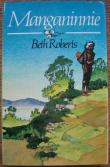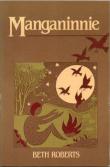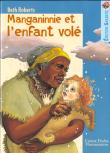
The material on this page is available to AustLit subscribers. If you are a subscriber or are from a subscribing organisation, please log in to gain full access. To explore options for subscribing to this unique teaching, research, and publishing resource for Australian culture and storytelling, please contact us or find out more.
Latest Issues
AbstractHistoryArchive Description
During the black drive of 1830, Manganinnie, an old Aboriginal woman, becomes separated from her tribe. Alone, she waits, seeking comfort from her firestick. Dremereeene, the ancestral spirit, sends her something precious to care for and love. (Libraries Australia)
Adaptations
-
form
y
 Manganinnie
( dir. John Honey
)
Hobart
:
Tasmanian Film Corporation
,
1980
Z795148
1980
single work
film/TV
children's
historical fiction
Manganinnie
( dir. John Honey
)
Hobart
:
Tasmanian Film Corporation
,
1980
Z795148
1980
single work
film/TV
children's
historical fiction
While fleeing the 1830 genocide of Tasmanian Aboriginals, Manganinnie rescues a tiny lost white child. Together they find compassion, love, and a bond that delivers them from desperation, loneliness, and the terror of pursuit.
Affiliation Notes
-
This work is affiliated with the AustLit subset Asian-Australian Children's Literature and Publishing because it has a Japanese translation.
Publication Details of Only Known VersionEarliest 2 Known Versions of
Other Formats
- Also braille, sound recording.
Works about this Work
-
y
 The Roving Party : Extinction Discourse in the Literature of Tasmania
2009
Z1775389
2009
single work
thesis
'The nineteenth century discourse of extinction - a consensus of thought primarily based upon the assumption that 'savage' races would be displaced by the arrival of European civilisation - provided the intellectual foundation for policies which resulted in Aboriginal dispossession, internment, and death in Tasmania. For a long time, the Aboriginal Tasmanians were thought to have been annihilated. However, this claim is now understood to be fanciful. Aboriginality is no longer defined as a racial category but rather as an identity that has its basis in community. Nevertheless, extinction discourse continues to shape the features of modern literature about Tasmania.
The Roving Party : Extinction Discourse in the Literature of Tasmania
2009
Z1775389
2009
single work
thesis
'The nineteenth century discourse of extinction - a consensus of thought primarily based upon the assumption that 'savage' races would be displaced by the arrival of European civilisation - provided the intellectual foundation for policies which resulted in Aboriginal dispossession, internment, and death in Tasmania. For a long time, the Aboriginal Tasmanians were thought to have been annihilated. However, this claim is now understood to be fanciful. Aboriginality is no longer defined as a racial category but rather as an identity that has its basis in community. Nevertheless, extinction discourse continues to shape the features of modern literature about Tasmania.
'The first chapter of this dissertation will examine how extinction discourse was imagined in the nineteenth century and will trace the parallels that contemporary fiction about contact history shares with it. The novels examined include Doctor Wooreddy's Prescription for Enduring the Ending of the World by Mudrooroo, The Savage Crows by Robert Drewe, Manganinnie by Beth Roberts, and Wanting by Richard Flanagan. The extinctionist elements in these novels include a tendency to euglogise about the 'lost race' and a reliance on the trope of the last man or woman.
'The second chapter of the dissertation will examine novels that attempt to construct a representation of Aboriginality without reference to extinction. These texts subvert and ironise extinction discourse as a way of breaking the discursive continuities with colonialism and establishing a more nuanced view of Aboriginal identity in a post-colonial context. Novels analysed here include Drift by Brian Castro, Elysium by Robert Edric, and English Passengers by Matthew Kneale. However, in attempting to arrive at new understandings about Aboriginality, non-Aboriginal authors are hindered by the epistemological difficulties of knowing and representing the Other. In particular, they seem unable to extricate themselves from the binaries of colonialism.' (Trove) -
Beth Roberts 'Manganinnie' : Authenticity and Reconstruction in the German Version of an Australian Children's Classic.
1999
single work
criticism
— Appears in: Journal of Translation and Textlinguistics , vol. 12 no. 1999; (p. 76-84) -
Manganinnie
1999
single work
criticism
— Appears in: The Country of Lost Children : An Australian Anxiety 1999; (p. 164-168) -
Untitled
1993
single work
review
— Appears in: Reading Time : The Journal of the Children's Book Council of Australia , November vol. 37 no. 4 1993; (p. 33)
— Review of Manganinnie 1979 single work novel -
Manganinnie Given Even More Integrity
1993
single work
review
— Appears in: The Saturday Mercury , 2 October 1993; (p. 28)
— Review of Manganinnie 1979 single work novel
-
Untitled
1993
single work
review
— Appears in: Reading Time : The Journal of the Children's Book Council of Australia , November vol. 37 no. 4 1993; (p. 33)
— Review of Manganinnie 1979 single work novel -
Manganinnie Given Even More Integrity
1993
single work
review
— Appears in: The Saturday Mercury , 2 October 1993; (p. 28)
— Review of Manganinnie 1979 single work novel -
Tassie Book Bound for Land of Nippon
Dani Hayes
(interviewer),
1987
single work
interview
— Appears in: The Mercury , 28 February 1987; -
Beth Roberts 'Manganinnie' : Authenticity and Reconstruction in the German Version of an Australian Children's Classic.
1999
single work
criticism
— Appears in: Journal of Translation and Textlinguistics , vol. 12 no. 1999; (p. 76-84) -
y
 The Roving Party : Extinction Discourse in the Literature of Tasmania
2009
Z1775389
2009
single work
thesis
'The nineteenth century discourse of extinction - a consensus of thought primarily based upon the assumption that 'savage' races would be displaced by the arrival of European civilisation - provided the intellectual foundation for policies which resulted in Aboriginal dispossession, internment, and death in Tasmania. For a long time, the Aboriginal Tasmanians were thought to have been annihilated. However, this claim is now understood to be fanciful. Aboriginality is no longer defined as a racial category but rather as an identity that has its basis in community. Nevertheless, extinction discourse continues to shape the features of modern literature about Tasmania.
The Roving Party : Extinction Discourse in the Literature of Tasmania
2009
Z1775389
2009
single work
thesis
'The nineteenth century discourse of extinction - a consensus of thought primarily based upon the assumption that 'savage' races would be displaced by the arrival of European civilisation - provided the intellectual foundation for policies which resulted in Aboriginal dispossession, internment, and death in Tasmania. For a long time, the Aboriginal Tasmanians were thought to have been annihilated. However, this claim is now understood to be fanciful. Aboriginality is no longer defined as a racial category but rather as an identity that has its basis in community. Nevertheless, extinction discourse continues to shape the features of modern literature about Tasmania.
'The first chapter of this dissertation will examine how extinction discourse was imagined in the nineteenth century and will trace the parallels that contemporary fiction about contact history shares with it. The novels examined include Doctor Wooreddy's Prescription for Enduring the Ending of the World by Mudrooroo, The Savage Crows by Robert Drewe, Manganinnie by Beth Roberts, and Wanting by Richard Flanagan. The extinctionist elements in these novels include a tendency to euglogise about the 'lost race' and a reliance on the trope of the last man or woman.
'The second chapter of the dissertation will examine novels that attempt to construct a representation of Aboriginality without reference to extinction. These texts subvert and ironise extinction discourse as a way of breaking the discursive continuities with colonialism and establishing a more nuanced view of Aboriginal identity in a post-colonial context. Novels analysed here include Drift by Brian Castro, Elysium by Robert Edric, and English Passengers by Matthew Kneale. However, in attempting to arrive at new understandings about Aboriginality, non-Aboriginal authors are hindered by the epistemological difficulties of knowing and representing the Other. In particular, they seem unable to extricate themselves from the binaries of colonialism.' (Trove) -
Manganinnie
1999
single work
criticism
— Appears in: The Country of Lost Children : An Australian Anxiety 1999; (p. 164-168)
Last amended 11 Feb 2016 11:39:52
Settings:
- 1830s
Export this record




